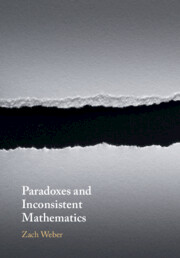Book contents
1 - Paradoxes; or, “Here in the Presence of anAbsurdity”
from Part I - What Are the Paradoxes?
Published online by Cambridge University Press: 08 October 2021
Summary
This chapter introduces paradoxes from three areas. First, the famousantinomies from Frege–Cantor set theory are presented asconsequences of the naive set concept; the standard solution,Zermelo–Fraenkel set theory and the idea of iterative sets,is discussed and found to be problematic. Second, the soritesparadox for vague predicates/properties is presented, and somestandard solutions are discussed, putting the focus on“cutoff points.” A paraconsistent “glut”approach is recommended as the best way to accept the existence ofcutoff points, as inconsistent and not unique. Third, a puzzle aboutboundaries in space is presented, standard solutions discussed andfound wanting, and a paraconsistent response outlined. It issuggested that all three paradoxes are interrelated by the conceptof “revenge” and should be met with dialetheism.
- Type
- Chapter
- Information
- Paradoxes and Inconsistent Mathematics , pp. 28 - 59Publisher: Cambridge University PressPrint publication year: 2021

